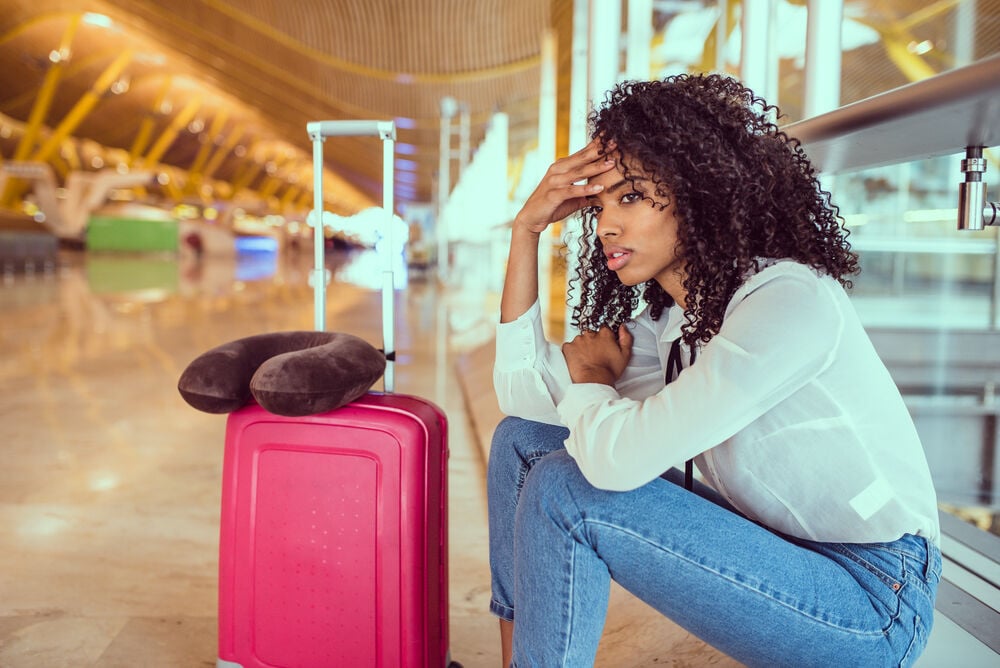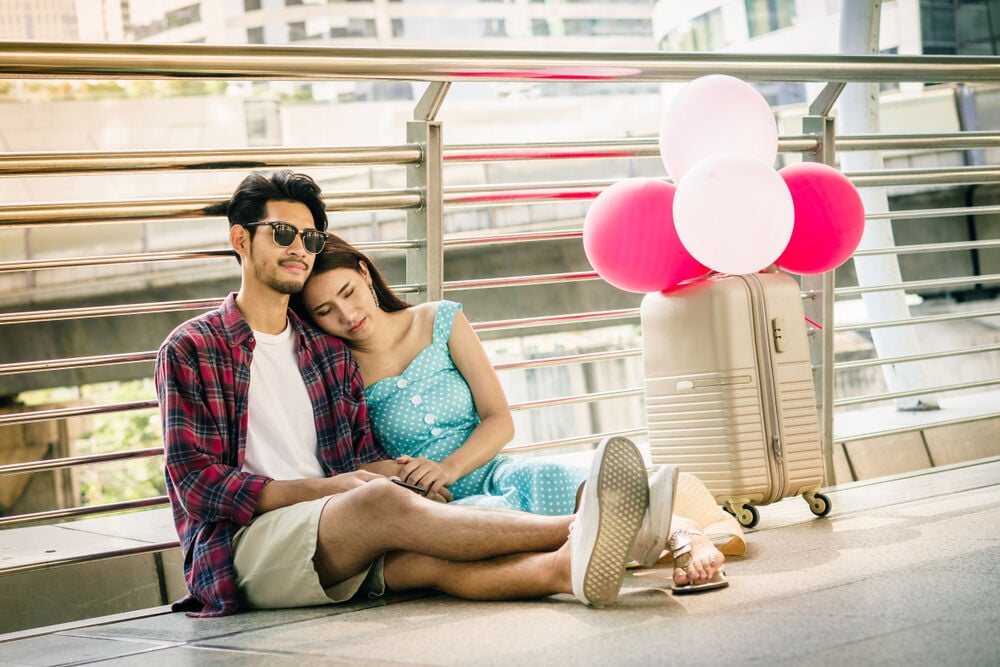Learn how traveling can affect your menstrual cycle, including why late and missed periods can be natural when you’ve been traveling.
-
Tracking cycle
-
Getting pregnant
-
Pregnancy
-
Help Center
-
Flo for Partners
-
Anonymous Mode
-
Flo app reviews
-
Flo Premium New
-
Secret Chats New
-
Symptom Checker New
-
Your cycle
-
Health 360°
-
Getting pregnant
-
Pregnancy
-
Being a mom
-
LGBTQ+
-
Quizzes
-
Ovulation calculator
-
hCG calculator
-
Pregnancy test calculator
-
Menstrual cycle calculator
-
Period calculator
-
Implantation calculator
-
Pregnancy weeks to months calculator
-
Pregnancy due date calculator
-
IVF and FET due date calculator
-
Due date calculator by ultrasound
-
Medical Affairs
-
Science & Research
-
Pass It On Project New
-
Privacy Portal
-
Press Center
-
Flo Accuracy
-
Careers
-
Contact Us
Can Traveling Affect Your Period?


Every piece of content at Flo Health adheres to the highest editorial standards for language, style, and medical accuracy. To learn what we do to deliver the best health and lifestyle insights to you, check out our content review principles.
Stress may have an impact
Stress is known to have the ability to disrupt a normal menstrual cycle. Hormones released during stress otherwise harm the overall health, but when it comes to a period, they have a more evolutionary, primal role.
Essentially, your body's hormonal balance during stress will disrupt and result in late ovulation. In some women, ovulation may not even occur during stressful times.
Scientists explain this with the body's strategy to avoid pregnancy in an uncertain environment. Essentially, stress signals that your body is under distress and not in a safe environment. In some cases, a mechanism to prevent pregnancy activate in form of period delay.
How this relates to traveling on your period? Not all trips and vacations are stress-free. You might have a great time, but if you drink too much and sleep too little, your body is actually suffering stress.
Stress can suppress the pituitary gland functions, affecting the production of estrogen, which in return disrupts the ovulation. You can trigger this body response even if you mentally feel good, excited and entertained if you're partying too much and sleeping too little.

Jet lag is likely to affect your cycle
Whenever your sleep cycle gets disrupted, there's a possibility for your menstrual cycle to fall out of order as well. If you're switching time zones, your circadian rhythm (the body's "inner clock") also falls out of balance.
As the circadian rhythm plays a role in the hormonal balance that dictates the menstrual cycle (progesterone, testosterone, and estrogen), any changes in your natural biorhythm could also reflect on your period.
Jet lag will cause you to feel constantly asleep but have trouble staying asleep when you're supposed. This disbalance also leads to stress which, you guess right, affects your period.
Take a quiz
Find out what you can do with our Health Assistant
Hormonal changes
How exactly travel affects your hormones, triggering the changes in the menstrual cycle and the period delay?
Hormone levels during cycle shift as your body works to produce a fertile egg. Your period happens when an egg released in ovulation is unfertilized. In absence of fertilization and implantation, LH decreases which results in progesterone and estradiol decrease, regressing corpus luteum results in sloughing of the endometrial lining. The bleeding lasts about 3-7 days.
Travel-induced stress, even positive, troubled sleep, and other sudden lifestyle changes, can affect this balance. No one can predict how your body will react to these changes, but you can expect to have both early and late period.
Sleep issues
Travel disrupts normal sleep for multiple common reasons. Not everyone handles changing environments well. If the trip is long, or uncomfortable, or you're vacationing in a complete opposite climate than you're used to, it can affect the sleep quality. A lot of people have trouble falling asleep when changing environments, and many also can't sleep in high temperatures.
Additionally, changing the climate to tropical/marine or mountain can also affect blood pressure and make you more groggy or agitated. All of this affects your sleep, which entails further hormonal imbalance.
Changes in diet and exercise routine
Needless to say, you most likely won't go for a morning jog and stick to your lean diet on vacation. More likely, you'll binge on local treats, drink plenty of alcohol and sweet cocktails, stay up until late at night and wake up late in the afternoon. Most people abandoned healthy routines and enjoy leisure time on vacation, which only adds up to the "positive" body stress.
And if I'm on birth control?
Travel shouldn't affect your period if you're on birth control.
Still, there are a couple of roles to taking birth control when you're switching time zones if you want to avoid getting pregnant.
First, you should take your daily dose according to your local time zone, not the time zone you are visiting. If the time in which you're supposed to take the pill is extremely inconvenient, delaying one dose for a couple of hours shouldn't be a problem.
However, if you're taking a time-sensitive pill, like progestin, remember that you must take it within three hours from your usual time, otherwise, you'll be skipping a dose.
Also, keep in mind that some birth control brands aren't effective when combined with alcohol. Read the birth control pill instruction and check if the manufacturer warns against taking alcohol. To be safe, the best option is to still use another form of birth control on vacation.

6 tips to manage your period during traveling
Here are a couple of tips for maintaining a regular cycle while on travel:
- Be prepared. Count in the jet lag and the climate change and do as much as you can to adapt to a new cycle before going for a trip. Some people find it useful to spend a night awake before the trip and (if needed) sleep during the day, or on a plane. This will give you a head start with adjusting to a new environment.
- Stick (as much as possible) to your regular routine. If you plan on enjoying the charms of local cuisine, at least make sure to schedule your meals as you normally do. If you're otherwise very active and a regular gym member, remember to stay active on travel as well.
- Don't go overboard with alcohol. If late periods are hard on you, refrain from excess amounts of alcohol.
- Apply these tips for better sleep. If you know you have trouble sleeping while on travel, gather the supplies that help you unwind and relax. Teas, essential oils, special pillows, and music, or your favorite cover, will help you relax and fall asleep easier.
- Count in the positive stress and relax more. Traveling to a new destination should be all about having the time of your life, but don't forget to relax. If you want to avoid painful late periods, relax when you feel overwhelmed and exhausting, no matter how entertaining the experience is.
- If you prefer to use a menstrual cup, make sure to have multiple ones at your disposal, along with a set of top-notch cleaning supplies. You want to be able to finish the emptying and cleaning process in a fast and sanitary fashion, which demands all of the supplies to be by your side: a cleaning solution, a hand sanitizer, wipes (wet and paper), as well as a spare cup.
- Apply the most effective methods to reduce period cramps while traveling. If you don't suffer from any other conditions, and you're otherwise safe to take pain medication, have your best pain reliever with you.
- Drink enough water. If you're being very active during your trip, you're most likely to get sick while on period. Pay attention to hydration, especially in summer. Drinking enough water will also help to reduce period cramps.

Track symptoms and patterns
Learn to spot patterns in your cycle as they can provide insight into underlying medical conditions
Bottom line
Travel does affect your period. You might also be tempted to learn how to delay your period when planning a vacation. The best and the only way to preserve your usual menstrual cycle on travel is to avoid imposing stress on your body. Changes in the menstrual cycle on vacation happen due to shifts in the body's natural biorhythm due to lack of sleep, diet changes, and intense excitement.
Having a late period can be unpleasant for more reasons than shifting your schedule. Delayed periods can be more unpleasant and painful, as they can cause stronger cramping.
Bleeding can also become more intense with a late period. Late periods can become additionally awkward if you're on hormonal treatment or pending for appointments or tests that depend on your menstrual cycle, such as Pap smear.
If you're one of the women who have a hard time coping with late periods, or you want to keep your period regular for other medical reasons, make the changes lighter on your body.
Do as much as you can to relax and sleep well and tweak your agenda to match your normal mealtimes and activity levels. It's very likely you'll still have a small delay in period, but the side effects will be easier to cope with.


Hey, I'm Anique
I started using Flo app to track my period and ovulation because we wanted to have a baby.


The Flo app helped me learn about my body and spot ovulation signs during our conception journey.


I vividly
remember the day
that we switched
Flo into
Pregnancy Mode — it was
such a special
moment.
Real stories, real results
Learn how the Flo app became an amazing cheerleader for us on our conception journey.




